First Person: 'We Have Found a Better Land' | reviews, news & interviews
First Person: 'We Have Found a Better Land'
First Person: 'We Have Found a Better Land'
BBC National Chorus of Wales's composer-in-residence seeks inspiration in Welsh Patagonia for a new commission
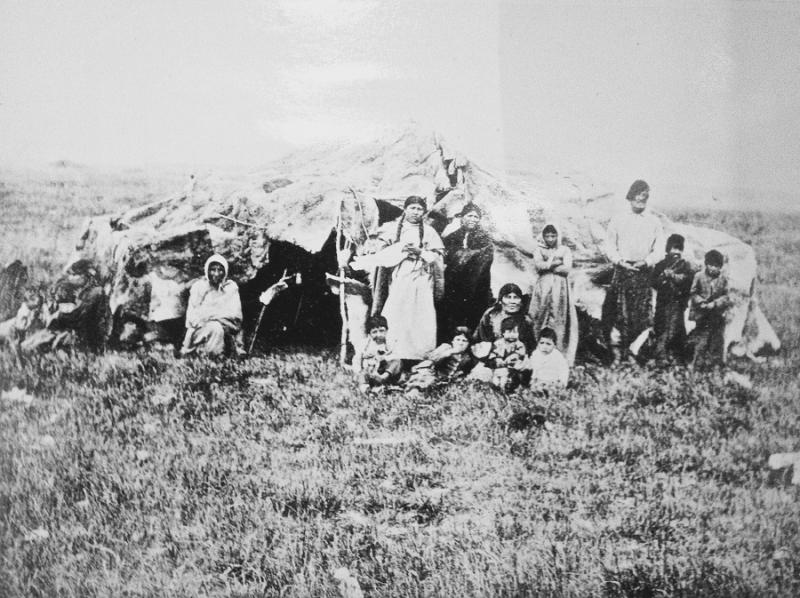
"Helo, ti yw Mark?" A friendly-looking woman on the tiny plane asks me my name. She is a teacher from a Welsh-speaking school in Patagonia, Ysgol yr Hendre, escorting her pupils home from a trip to Cardiff. "I was told to look out for you on the plane. Come and sit with us!" she continues.
I spend the rest the journey chatting to the teachers and schoolchildren about their recent adventures in Wales before landing at a tiny airport plonked in the middle of a vast plain. Stepping off the plane, I am struck by an overwhelming sense of space – the massive skies of Patagonia seem to go on forever. I say my goodbyes to my new friends, promising to visit the school over the coming days, and look for my host, Ana Chiabrando Rees, who has kindly offered to pick me up. Ana runs the guest house, Plas y Coed, where I’m staying. We drive the 10 miles or so from the airport to the lovely town of Gaiman and chat the whole way as though we were old friends. By the time we arrive at Ana’s guest house I’m armed with useful information about where to go and who to meet over the coming days. (Pictured below: Mark Bowden plays a Welsh organ in the Museo Histórico Regional, Gaiman)
 To clear my head, I walk along the heritage trail in Gaiman, taking in the colossal landscape of the surrounding desert and exploring the very first buildings to be built by the Welsh in Patagonia. I come to the Museo Antropológico, which preserves the fragmentary remains of the indigenous Tehuelche culture. The story goes that the Tehuelche befriended the desperate Welsh settlers in the early days of Y Wladfa teaching them how to use the land, to hunt guanacos and rhea birds, and to trade with merchants in Buenos Aires. During military campaigns in the 1870s, known as the Conquest of the Desert, Argentina colonised the wild landscapes of Patagonia wiping out almost entirely the native people in the process, to the dismay of the Welsh population. My piece draws upon Tehuelche creation myths collected in Johannes Wilbert and Karin Simoneau’s Folk Literature of the Tehuelche Indians. In the final movement, lines from a letter written by Julio Roca – the army general who would become President of Argentina – to the minister of war are interspersed with a mythological image of a sacred meteorite, believed by the Tehuelche to be the embodiment of the first primordial woman.
To clear my head, I walk along the heritage trail in Gaiman, taking in the colossal landscape of the surrounding desert and exploring the very first buildings to be built by the Welsh in Patagonia. I come to the Museo Antropológico, which preserves the fragmentary remains of the indigenous Tehuelche culture. The story goes that the Tehuelche befriended the desperate Welsh settlers in the early days of Y Wladfa teaching them how to use the land, to hunt guanacos and rhea birds, and to trade with merchants in Buenos Aires. During military campaigns in the 1870s, known as the Conquest of the Desert, Argentina colonised the wild landscapes of Patagonia wiping out almost entirely the native people in the process, to the dismay of the Welsh population. My piece draws upon Tehuelche creation myths collected in Johannes Wilbert and Karin Simoneau’s Folk Literature of the Tehuelche Indians. In the final movement, lines from a letter written by Julio Roca – the army general who would become President of Argentina – to the minister of war are interspersed with a mythological image of a sacred meteorite, believed by the Tehuelche to be the embodiment of the first primordial woman.
I visit the Museo Histórico Regional located at the old railway station in Gaiman. With the assistance of museum director Fabio González I sift through diaries, letters, stories and poetry in the museum’s archives. I come across the diary of Joseph Seth Jones, written aboard the Mimosa, the tea clipper which carried the first Welsh settlers to Patagonia in 1865. The diary contains both poignant and mundane observations about the arduous, gruelling voyage. My own translations of a few lines from Joseph’s diary, alongside a verse sung by the first settlers during their departure from Liverpool in 1865, appear in the piece. Fragments from letters and prose written by the Patagonian author Eluned Morgan, who was born aboard the ship Myfanwy during its journey from Britain to Argentina in 1870, have also made their way into the piece in beautiful translations by E Wyn James. Morgan’s fragments are set alongside lines from William Jones of Bala’s 1865 letter to relatives back home in Wales about the bitter disappointment he felt towards the "infinite plain, without trees or rocks" that he found himself in.
 Gaiman and the surrounding valley is not the whole story of the Welsh in Argentina. In the 1880s a band of men, known as Los Rifleros, trekked from the Chubut Valley to the Andes in search of better land. I follow their trail in the relative comfort of a Don Otto bus and am struck by the contrasts between the arid East and the mountainous West (pictured above). The full drama of the Paith – the Welsh name for the interior steppe lands of Patagonia – unfolds before me as I try to imagine the hardship experienced by those early trailblazers who set out in search of a better land.
Gaiman and the surrounding valley is not the whole story of the Welsh in Argentina. In the 1880s a band of men, known as Los Rifleros, trekked from the Chubut Valley to the Andes in search of better land. I follow their trail in the relative comfort of a Don Otto bus and am struck by the contrasts between the arid East and the mountainous West (pictured above). The full drama of the Paith – the Welsh name for the interior steppe lands of Patagonia – unfolds before me as I try to imagine the hardship experienced by those early trailblazers who set out in search of a better land.
In the Andes I stay with Jorge Miglioli, a descendant of one of the original Rifleros. We chat into the evenings about the Welsh in Patagonia and how the Andean settlements came to be established. He shares with me his book Rocky Trip, which includes his own translation of a poem, "Los Altares", by Patagonian poet Owen Tydur Jones. The poem contemplates monumental natural rock sculptures located deep in the Paith alongside the destruction of the Tehuelche people. With Owen and Jorge’s blessing I have used the poem to conclude the work.
So my piece, entitled We Have Found a Better Land, has been inspired by the extraordinary spaciousness of the landscape and by the unusual story of the Welsh settlers and their remarkable legacy which lives on in modern Patagonia, for sure. But the music has also been influenced by the Tehuelche – a people and culture whose ties to the land date back over 13,000 years and who were vital to the survival of the early Welsh settlers.
- Mark Bowden's We Have Found a Better Land will be premiered in Hoddinott Hall, Cardiff on Sunday 15 November
- The BBC National Orchestra of Wales is currently on tour in Argentina. Their concert from the Teatro Colón in Buenos Aires is available on the iPlayer
- Mark Bowden's website
Overleaf: browse images from the visit to Welsh Patagonia by harpist Catrin Finch, conductor Grant Llewelyn and members of the BBC National Orchestra of Wales
The BBC National Orchestra of Wales visited Argentina as part of the 150th anniversary celebrations of the Welsh settlement in Patagonia. Harpist Catrin Finch joined them as they toured schools. They went to Puerto Madryn, where the Mimosa made landfall in 1865, and Trelew, home of the Welsh-language school Ysgol yr Hendre, and also visited Gaiman, spiritual home of the Welsh in Patagonia.
Click on the thumbnails below to enlarge.
Explore topics
Share this article
Add comment
more Classical music
 Bell, Perahia, ASMF Chamber Ensemble, Wigmore Hall review - joy in teamwork
A great pianist re-emerges in Schumann, but Beamish and Mendelssohn take the palm
Bell, Perahia, ASMF Chamber Ensemble, Wigmore Hall review - joy in teamwork
A great pianist re-emerges in Schumann, but Beamish and Mendelssohn take the palm
 First Persons: composers Colin Alexander and Héloïse Werner on fantasy in guided improvisation
On five new works allowing an element of freedom in the performance
First Persons: composers Colin Alexander and Héloïse Werner on fantasy in guided improvisation
On five new works allowing an element of freedom in the performance
 First Person: Leeds Lieder Festival director and pianist Joseph Middleton on a beloved organisation back from the brink
Arts Council funding restored after the blow of 2023, new paths are being forged
First Person: Leeds Lieder Festival director and pianist Joseph Middleton on a beloved organisation back from the brink
Arts Council funding restored after the blow of 2023, new paths are being forged
 Classical CDs: Nymphs, magots and buckgoats
Epic symphonies, popular music from 17th century London and an engrossing tribute to a great Spanish pianist
Classical CDs: Nymphs, magots and buckgoats
Epic symphonies, popular music from 17th century London and an engrossing tribute to a great Spanish pianist
 Sheku Kanneh-Mason, Philharmonia Chorus, RPO, Petrenko, RFH review - poetic cello, blazing chorus
Atmospheric Elgar and Weinberg, but Rachmaninov's 'The Bells' takes the palm
Sheku Kanneh-Mason, Philharmonia Chorus, RPO, Petrenko, RFH review - poetic cello, blazing chorus
Atmospheric Elgar and Weinberg, but Rachmaninov's 'The Bells' takes the palm
 Daphnis et Chloé, Tenebrae, LSO, Pappano, Barbican review - lighting up Ravel’s ‘choreographic symphony’
All details outstanding in the lavish canvas of a giant masterpiece
Daphnis et Chloé, Tenebrae, LSO, Pappano, Barbican review - lighting up Ravel’s ‘choreographic symphony’
All details outstanding in the lavish canvas of a giant masterpiece
 Goldscheider, Spence, Britten Sinfonia, Milton Court review - heroic evening songs and a jolly horn ramble
Direct, cheerful new concerto by Huw Watkins, but the programme didn’t quite cohere
Goldscheider, Spence, Britten Sinfonia, Milton Court review - heroic evening songs and a jolly horn ramble
Direct, cheerful new concerto by Huw Watkins, but the programme didn’t quite cohere
 Marwood, Power, Watkins, Hallé, Adès, Bridgewater Hall, Manchester review - sonic adventure and luxuriance
Premiere of a mesmeric piece from composer Oliver Leith
Marwood, Power, Watkins, Hallé, Adès, Bridgewater Hall, Manchester review - sonic adventure and luxuriance
Premiere of a mesmeric piece from composer Oliver Leith
 Elmore String Quartet, Kings Place review - impressive playing from an emerging group
A new work holds its own alongside acknowledged masterpieces
Elmore String Quartet, Kings Place review - impressive playing from an emerging group
A new work holds its own alongside acknowledged masterpieces
 Gilliver, LSO, Roth, Barbican review - the future is bright
Vivid engagement in fresh works by young British composers, and an orchestra on form
Gilliver, LSO, Roth, Barbican review - the future is bright
Vivid engagement in fresh works by young British composers, and an orchestra on form
 Josefowicz, LPO, Järvi, RFH review - friendly monsters
Mighty but accessible Bruckner from a peerless interpreter
Josefowicz, LPO, Järvi, RFH review - friendly monsters
Mighty but accessible Bruckner from a peerless interpreter
 Cargill, Kantos Chamber Choir, Manchester Camerata, Menezes, Stoller Hall, Manchester review - imagination and star quality
Choral-orchestral collaboration is set for great things
Cargill, Kantos Chamber Choir, Manchester Camerata, Menezes, Stoller Hall, Manchester review - imagination and star quality
Choral-orchestral collaboration is set for great things



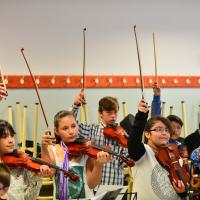
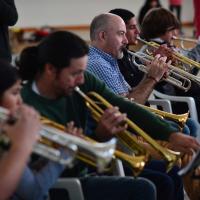
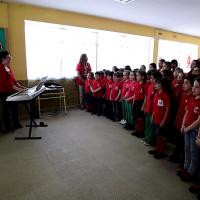

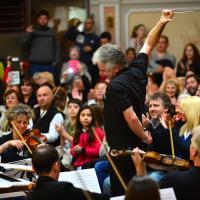
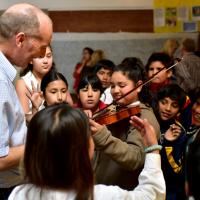
Comments
Hello!